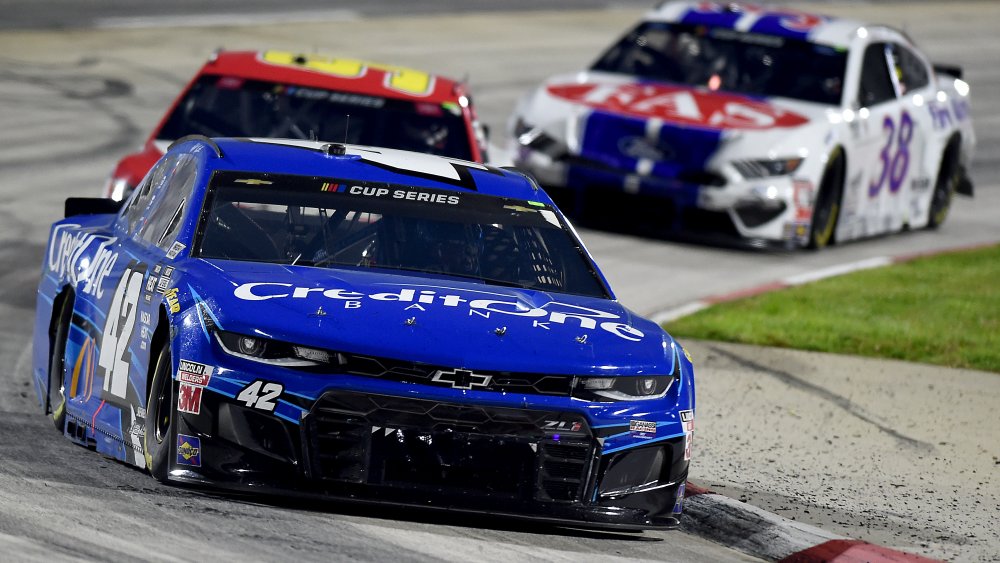The Economic Impact of NASCAR: How Stock Car Racing Fuels Local and Global Economies
NASCAR’s Role in the Global Economy
The National Association for Stock Car Auto Racing (NASCAR) is not only a beloved motorsport but also a major economic engine, particularly in the United States. As one of the highest-grossing sports in the country, NASCAR influences various sectors including tourism, hospitality, media, and manufacturing. The economic benefits derived from NASCAR are felt at local, regional, and even international levels. Events like the Daytona 500 and the Coca-Cola 600 draw millions of spectators, while the sport’s sponsorships, media rights, and merchandising provide substantial financial windfalls to various stakeholders.
In this blog, we’ll explore NASCAR’s economic impact, breaking down how it affects host cities, the national economy, and even the global market. We will also analyze the financial aspects of team operations, sponsorships, media contracts, and how NASCAR’s expansion efforts influence its economic footprint.
I. The Economic Impact on Host Cities: Tourism and Local Business Growth
A. NASCAR’s Role in Boosting Local Economies
- Tourism and Event Spending
One of the largest direct impacts NASCAR has on host cities is through tourism. Major races, such as the Daytona 500 in Florida and the Brickyard 400 in Indiana, draw hundreds of thousands of spectators, many of whom travel long distances to attend these events. According to a report by the Daytona Beach News-Journal, the Daytona 500 generates over $1 billion in economic activity annually for the state of Florida. Spectators not only purchase tickets to the races, but they also spend money on accommodations, dining, transportation, and other entertainment options.
Local businesses, particularly those in hospitality and retail, see a surge in revenue during race weeks. Hotels near NASCAR tracks often report full occupancy, while restaurants, bars, and shops experience higher-than-average sales. The impact is also felt by other service industries, including car rentals, security services, and food vendors.

- Long-Term Economic Benefits
Beyond the immediate financial influx from tourists, NASCAR events can have lasting effects on host cities by increasing their visibility and reputation as tourist destinations. Daytona Beach, for example, has built a brand closely associated with auto racing, making it a popular year-round destination for motorsports enthusiasts. The investment in infrastructure improvements, such as road expansions and stadium renovations, often required to host NASCAR events can also provide long-term economic benefits to the community.
B. Job Creation and Local Employment
- Temporary and Permanent Jobs
NASCAR events create thousands of temporary jobs in areas like event management, security, concessions, and hospitality. Additionally, there are more permanent jobs connected to track operations, maintenance, and tourism activities associated with race venues. According to a study conducted by The Charlotte Observer, the Charlotte Motor Speedway supports over 4,000 jobs in the local area, ranging from track employees to suppliers who provide goods and services for the events.
- Local Contractors and Vendors
In addition to the direct employment effects, NASCAR also supports local businesses by contracting with vendors for various services, including catering, maintenance, and construction. NASCAR’s supply chain is extensive, encompassing industries as varied as transportation, marketing, and telecommunications. This ecosystem not only provides opportunities for local entrepreneurs but also fosters business-to-business transactions that further stimulate the local economy.
II. The National Economic Footprint: Sponsorships, Teams, and Media Rights
A. NASCAR’s Sponsorship Revenue
- The Power of Corporate Sponsorships
Sponsorship is one of NASCAR’s largest revenue streams, with major corporations like Coca-Cola, Toyota, and Goodyear investing heavily in the sport. Sponsorship deals fund individual race teams, track events, and NASCAR itself. The Wall Street Journal reports that the value of NASCAR sponsorships exceeds $3 billion annually, with companies paying top dollar for prominent advertising space on cars, tracks, and media broadcasts.
Sponsorships have a reciprocal effect: they not only support the financial health of the sport but also provide companies with extensive exposure to NASCAR’s loyal fan base. Brand loyalty in NASCAR is particularly strong, with fans often showing a preference for products associated with their favorite teams or drivers.
- How Sponsorships Benefit the Broader Economy
The economic impact of sponsorships extends beyond NASCAR and its teams. Companies that invest in NASCAR often spend additional money on advertising, marketing, and promotional campaigns tied to their sponsorships. This spending generates jobs and stimulates other sectors of the economy, such as media production, creative design, and digital marketing. Additionally, the partnerships between NASCAR and its sponsors have led to technological innovations in areas like automotive safety, fuel efficiency, and tire manufacturing, benefiting the broader economy.
B. Team Operations and Expenditures
- Costs of Running a NASCAR Team
Running a NASCAR team is an expensive endeavor. The costs involved in competing at the highest level include building and maintaining cars, hiring staff, travel expenses, and race entry fees. According to Forbes, the average cost to field a competitive NASCAR team is between $15 million and $25 million annually. These expenses create a ripple effect, as teams rely on suppliers, engineers, mechanics, and designers to operate efficiently.
- Economic Impact on Suppliers and Manufacturers
The demand for high-performance automotive parts, specialized equipment, and advanced technology creates significant economic opportunities for suppliers and manufacturers. Companies that produce tires, engines, and safety equipment benefit from NASCAR’s stringent performance and safety standards. Moreover, NASCAR’s push for greener, more efficient technology—such as the move to ethanol-blended fuel—has stimulated innovation within the automotive industry.
III. NASCAR’s Media and Broadcast Revenue
A. Broadcasting Rights and Their Economic Value
- The Role of Media in NASCAR’s Financial Model
One of the major sources of income for NASCAR is its media rights deals. In 2015, NASCAR signed a $8.2 billion contract with Fox Sports and NBC Sports to broadcast races over 10 years. This deal significantly increased NASCAR’s exposure and ensured that the sport reached millions of viewers each season. Revenue from media rights helps fund race teams, tracks, and NASCAR’s administrative operations.
- Economic Impact on Broadcasters
Media companies benefit from NASCAR’s popularity by securing advertising dollars from major brands that want to reach its dedicated fan base. The sport’s long races and weekend broadcasts offer significant airtime for commercials, making it a valuable asset for broadcasters. Additionally, NASCAR’s digital presence, including live streaming and social media engagement, has opened new revenue streams for both the sport and media companies.
B. Merchandising and Licensing Revenue
- The Business of NASCAR Merchandise
NASCAR has a thriving merchandising business that contributes to its overall economic impact. Fans purchase millions of dollars’ worth of merchandise each year, including apparel, die-cast models of cars, hats, and memorabilia. According to the NASCAR Foundation, merchandising revenue accounts for approximately 10% of the sport’s total income. Merchandise sales not only generate revenue for NASCAR but also support a network of manufacturers and retailers.
- Licensing Agreements and Their Economic Benefits
Licensing agreements allow NASCAR to extend its brand into various products, from video games to apparel lines. These agreements benefit both the licensee and NASCAR by creating additional streams of revenue. Licensing deals also create jobs in design, production, and retail sectors, further enhancing NASCAR’s economic footprint.
IV. The International Economic Reach of NASCAR
A. NASCAR’s Expansion into International Markets
- The NASCAR Whelen Euro Series
While NASCAR is predominantly a North American sport, it has made inroads into international markets through series like the NASCAR Whelen Euro Series. This European stock car series has helped NASCAR establish a presence in countries such as the United Kingdom, France, and Spain. The series generates local economic benefits in the form of tourism, media coverage, and sponsorship deals, helping to globalize NASCAR’s brand.
- Economic Challenges and Opportunities Abroad
Despite its success in the U.S., NASCAR faces challenges in expanding its international footprint. Other motorsports, such as Formula 1 and MotoGP, dominate the global racing scene, leaving NASCAR with stiff competition for fans and sponsorships. However, NASCAR’s entry into international markets has the potential to create new economic opportunities for local tracks, manufacturers, and media companies.
B. The Globalization of NASCAR’s Fan Base
- Reaching International Fans
The globalization of NASCAR is further driven by its international fan base, which has grown thanks to online streaming and digital media. Merchandise sales, digital content subscriptions, and international race broadcasts all contribute to NASCAR’s growing global revenue. This expansion into international markets not only enhances NASCAR’s economic impact but also promotes cultural exchange through motorsports.
NASCAR’s Long-Lasting Economic Legacy
NASCAR’s economic impact is vast, touching local communities, national industries, and even international markets. From job creation and tourism to sponsorships and media rights, the sport generates billions of dollars in economic activity each year. It fuels innovation in automotive technology, supports local economies through tourism, and provides jobs in various sectors, from media production to retail.
As NASCAR continues to grow, its economic footprint will likely expand, benefiting not only the motorsports industry but also a wide range of businesses and industries. With its loyal fan base and strong brand identity, NASCAR is well-positioned to remain a major economic player in the world of sports.
References:
- NASCAR Official Website. (2023). “Economic Impact of NASCAR Events.” Retrieved from nascar.com.
- Forbes. (2022). “The Business of NASCAR: Team Costs and Sponsorship Deals.” Retrieved from forbes.com.
- Daytona Beach News-Journal. (2021). “Economic Impact of the Daytona 500 on Florida.”
- The Charlotte Observer. (2020). “NASCAR and Local Job Creation: The Impact of Charlotte Motor Speedway.”
- Business of Sports Journal. (2019). “The Financial Footprint of NASCAR.”






